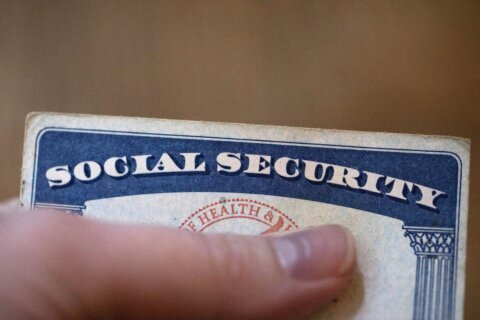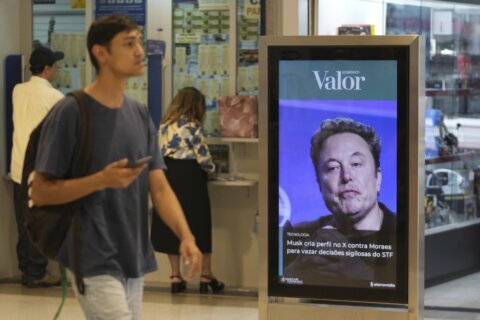LONDON — Consumers worldwide have been grappling with shortages and price increases for a wide variety of goods, thanks mainly to pandemic-caused stresses to global supply chains and a dearth of workers in some industries.
But for Britons, the situation is amplified by the United Kingdom‘s Brexit divorce from the European Union and its single market, which cut off its once ready supply of low-skilled workers from Europe.
Truck drivers, meat packers, construction workers and farm hands are among those jobs left begging, which has led to gas stations running out of fuel and empty grocery store shelves. And a rather not-so-merry Christmas looms, with predictions that there will be a scarcity of turkeys, Christmas trees, high-tech games and champagne.
Boris Johnson, the Conservative party prime minister, has described the problems as growing pains as the U.K.’s economy lurches back to life from pandemic shutdowns and copes with Brexit, which went into effect in January. But while he’s downplaying the economic effects of leaving the European Union, he’s calling this new post-Brexit era “a big turning point” that provides Britain with an opportunity to “go in a different direction.”
He blames the problems on the U.K.’s former dependence on migrant labor from Europe, as well as on businesses reluctant to increase wages and the failure to train enough domestic workers. “What I don’t do,” he recently said, “is go back to the old failed model of low wages, low skills, supported by uncontrolled immigration.”
But experts say that Johnson’s analysis of the British economy and his proposed fix are flawed.
Johnson is misrepresenting the history of migrant labor in Britain, says John Salt, a professor emeritus of geography and a migration expert at University College London. “If you look at U.K. immigration since 1945 onward, there’s been a reliance on low-skilled migrant labor, but it’s not true to say it was uncontrolled.”
There was, indeed, a huge influx of thousands of migrant workers between 2004 and 2012, mainly from Eastern and Central European countries newly merged into the EU. “But there were rules and regulations on who could claim benefits,” Salt says. Moreover, historically, he says, it’s been a “two-legged management process” of bringing in some high-skilled workers and many more low-skilled ones who particularly worked in hospitality, agriculture and care homes.
Salt is also skeptical of Johnson’s pledge to create an economy entirely based on high-skilled, high-paying jobs, because not everyone can qualify for those kinds of positions, and not all industries need skilled workers. “Some jobs will always pay less.”
Is it possible to push up wages and productivity by limiting unskilled migrant labor while welcoming some skilled foreign workers? Yes, says Simon Wren-Lewis, a professor emeritus of economic policy at the University of Oxford, “but it will be very disruptive in the short term.” And longer term, “ironically it means more native workers doing low-paid jobs.”
As Wren-Lewis explains, restricting immigration into some low-salary industries will increase wages in those sectors, but fewer immigrants means less demand, “so real wages elsewhere in the economy will fall,” thanks to inflation generated by the higher wages in some industries.
And while productivity may increase in those now better-paid sectors, it “will be offset by lower productivity (overall) because of lower demand.” Moreover, he adds, “by depriving the economy of some working immigrants, you remove a source of income paying taxes, which makes everyone worse off.”
Additionally, Salt says, trying to improve an economy by limiting immigration requires having an infrastructure in place to train domestic workers to take up more skilled jobs. “But that’s not the case in the U.K.,” he says, and hasn’t been since former Prime Minister Margaret Thatcher shuttered scores of industrial training boards in the 1980s. Wren-Lewis concurs: “The training stuff is just bluster. Every U.K. government I have known talked the talk about more training, but failed to provide these industries with the skills they need.”
Johnson’s fix “is a long-term solution,” Salt says, “and my impression is the government has no real conception of what happens if migrant laborers are not allowed in. There are no plans to do anything.”
Downing Street has tried to avoid blaming Brexit for manpower shortages and scarce consumer goods by claiming they are a global problem caused by the pandemic. And to be sure, many countries around the EU and the world have had to deal with a dearth of workers in some industries.
But Salt says Brexit has clearly exacerbated the problem in Britain.
“You can’t have 70 years of relying on the immigration of low-skilled labor and stop immediately and expect it to have no effect.”
The Road Haulage Association, for instance, says there’s a shortfall of 100,000 truck drivers, and about 20% of that number are drivers who returned to Europe after Brexit. No longer being able to tap into the EU labor market makes it harder for British businesses to recruit needed drivers.
Tacitly, Johnson has acknowledged as much. He’s offered time-extended temporary visas to 5,000 EU truck drivers and 800 more to abattoir workers.
Salt expects the government will eventually offer “temporary” visa regimens to other industries to help shore up the labor market. “But temporary schemes tend to stay in place.”
Last week, Chancellor of the Exchequer Rishi Sunak announced a new budget that includes 150 billion British pounds ($205.5 billion) in new spending, including more funding for the National Health Service and a 7% boost to the minimum wage, taking it to 9.50 pounds. The plan, which aims to bolster the economy, will take U.K. government spending and taxes to record levels.
That’s a far cry from the days soon after voters approved Brexit in 2016, when Tory politicians were talking about turning Britain into “Singapore-on-the-Thames,” or a lightly regulated, low-tax, low-wage economy with weak unions.
However, from the get-go that was a complete misreading of the Singaporean economy. “There is a degree of state control in Singapore that the Conservatives would be horrified with,” Wren-Lewis says.
Nevertheless, even if Conservative politicians’ were basing their projections on a false analogy, many clearly hoped Brexit would allow the government to turn Britain into a libertarian dreamland. Instead, it’s had the opposite effect.
Meanwhile, a government-created independent fiscal watchdog said last week that Brexit, largely because it distanced Britain from its largest trading partner, would weigh heavily on the U.K. economy for years to come.
The Office for Budget Responsibility says the effect of Brexit on the economy would be twice as worse as the pandemic’s. Brexit, it says, will reduce the country’s potential gross domestic product, a measure of a country’s entire economic activity, by 4% in the long term, while the pandemic would reduce it by a further 2%. Which means Sunak will likely have to keep his checkbook at the ready.
More from U.S. News
The United Kingdom Gets a Far East Makeover
10 Countries That Take the Most Immigrants
The 25 Best Countries in the World
Why the United Kingdom Is Facing Shortages of Basic Goods originally appeared on usnews.com







